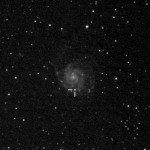We are celebrating a bit at Keck today. It is somewhat unusual for an astronomer to be awarded the Nobel Prize in Physics. Today it was announced that three astronomers will share the award for their work in cosmology. Saul Perlmutter, Brian Schmidt, and Adam Riess led a pair of teams that were investigating the expansion of the universe through observing type Ia supernovae. Saul Perlmutter led the Supernova Cosmology Project, while Brian Schmidt and Adam Riess led a separate group, the High-Z Supernova Search, performing nearly identical work.
Both teams discovered something disturbing in the data. The expansion of our universe appeared not to be slowing as astronomers expected, but actually accelerating. The result, had both teams scrambling to understand the data, checking and triple checking everything in an attempt to see where they had gone wrong in their analysis. When each team finally published they were glad to see that they were not alone, that another group had independently confirmed this unexpected discovery.
A couple decades later we have come to accept this result as further data has accumulated. We now understand that there is another element of the universe that had not been appreciated before. What the astronomers had found was the effects of something that had been hinted at in a number of physicists theories (including Einstein), something we now call Dark Energy.

The most critical data, the spectra of the furthest and faintest supernovae, were made possible by the Keck telescopes, then the largest in the world. It is these most distant objects where the effect of our universe’s accelerated expansion is most noticeable. Looking through the tables of data in the original scientific papers, the Keck Observatory is often credited.
It is somewhat unfortunate that only a few individuals are named with a Nobel Prize. The discovery of dark energy and the acceleration of the expansion was an effort made by teams of individuals. Both supernovae search teams and all the members deserve real recognition for this. In turn their efforts depended on the staffs of the observatories that made the observations possible. Big discoveries are rarely made by individual scientists, but by the cooperative effort of many. There are only three names on the Nobel Prize, but a lot of folks are celebrating today.

